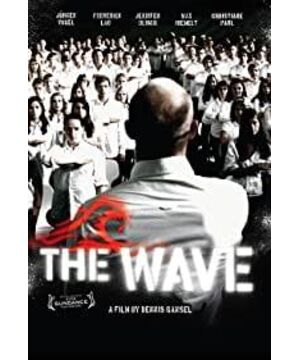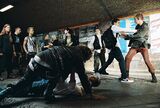Germans have a deep sense of guilt for World War II, so what happened in the United States, the Germans adapted it and became their own national reflection. And our China also has a treacherous history. The official discourse tried to avoid this, while the folk discourse was the opposite, extremely sensitive-this may be a resistance to the official-so seeing "The Tide", we did not hesitate to High.
The Germans label their films: "Reflections on Totalitarian Politics"; we get the pleasure of deconstructing official discourse from the viewing process.
Just, is this pleasure real?
The guilt of the Germans is too heavy, which sometimes makes them too sensitive and over-interpret some things; our official discourse is too strong, and its avoidance of that period of history is very infuriating, so sometimes we ignore it when we look for a breakthrough Object. After the pent-up excitement of watching the movie subsided, let us take a closer look at "The Tide", and it seems that we can ask: Is it appropriate to interpret it from the perspective of "showing the terribleness of totalitarianism"? In other words, even if the director's goal is to express the horror of totalitarianism, is this what the movie shows in the end?
When reviewing this movie from the perspective of critical totalitarian politics, it is difficult for us to explain why the group of German middle school students just stand up to answer questions and uniformly dress and fall into collective enthusiasm; and we are glorious and correct, sitting posture since we were young. The "Red Egg", who is upright and always wearing a school uniform like a big sack, will not pay homage to our class teacher. When only focusing on the deprivation of human rationality and freedom by totalitarian politics, it is difficult for us to explain: why people do this-why do they want to go to the collective if they know that there is a problem-to know, Even if it has experienced the Nazis, even if it has always had a tradition of authoritarianism, relatively speaking, Germany is a country with a much deeper democratic and free atmosphere than ours. At the same time, this movement called "The Tide" can be called a "neo-Nazi". The biggest tragedy it caused was that Tim finally killed and killed himself. However, Tim himself has psychological defects. And he shot at the end, not because he was involuntarily under the influence of the "wave", but because he couldn't accept that the wave was about to dissolve and his life had no sustenance, which led to a psychological breakdown, which led to tragedy.
The tragedy of World War II had a huge impact on human ethics. The American Jewish philosopher Hannah Arendt, after examining the trial of the Nazi war criminal Eichmann, put forward the view that the evil of totalitarian politics is a "banal evil". The so-called "banal evil" refers to the evil caused by people who do not think but only to perform their duties in a sinful system. She wrote: “Under the totalitarian rule of evil, the disasters caused by (human) non-thinking can far outweigh the sum of the harms of the evil instinct.” (Hannah Arendt, "Eichmann of Jerusalem: Ethics" "The Modern Dilemma") "Mediocre evil" is a superficial evil, an evil without ideals and depth. If in the film, Ma Kezhen was injured or killed in the clamor of killing by members of the wave, then it would truly show the evil of totalitarian politics-a collective unconscious "banal evil". Fortunately, the wave stopped abruptly at this time. Teacher Wengel reminded everyone in time: Doing this is a Nazi. And Tim also happened to be at this time, unable to accept this reality, unable to accept that the "collective" he was passionate about disappeared, causing a nervous breakdown and a tragedy. If we regard the tragedy caused by Tim as a totalitarian evil, we will not only show up, but also dispel the true meaning of the totalitarian evil. Because if so, it means that totalitarianism causes evil because there are social failures and mental disorders. However, it is not.
Therefore, we can say that "The Tide"'s critique of totalitarianism is powerless, or that it has not reached the height that it should be able to achieve. This is not to say that the film shows some aspects that seem to be good for totalitarian politics, such as allowing people to unite together to "do great things", giving people a sense of belonging, and finding a sense of belonging. In fact, these are exactly what totalitarian politics should be. "Severe authoritarian rule can be inspired by a warm family concept" (Xu Ben's "Intellectuals-My Thoughts and Our Behavior"), as Milan Kundera said: "The propaganda of a totalitarian society reveals It really smiles, it dresses itself up as'a big family'." (Milan Kundera, "The Art of Novels"). The film’s real powerlessness lies in the fact that as a film aimed at reflecting totalitarian politics, it shows the greatest tragedy, but it has little to do with totalitarian politics. The tragedy happened not because of totalitarian horror, but because of human weakness.
In 1967, American teacher Ron Jones experimented with students to see if a miniature Nazi Germany could be built. What happened after that was as described in "The Wave". It's just that there were no dead people at the time, and the experiment stopped on the verge of losing control. Afterwards, Ron Jones said in an interview with the media: “The reason why this experiment produced such results is because many of us are lonely, lack family warmth, collective care, and lack a sense of belonging to a group. This experiment is placed today, and the same result will be obtained... Go to your local school and see, can you find democracy there?"
Not only do people mention this experiment when they are commenting on "The Tide," people are talking about it. But he always ignored Ron Jones's words intentionally or unintentionally. Because this passage will make Jones' experiment more complicated and impure, it will make us have more worries and thoughts when evaluating this experiment, and will not be able to throw off our arms and directly fire on totalitarianism.
However, the gnawing of loneliness and helplessness on people's hearts is often beyond our expectations. Therefore, for totalitarian politics, we should not just stop at criticizing its evil. Jones's remarks cannot be ignored at any time. In fact, even if we are familiar with what happened in Auschwitz concentration camp and the Siberian ice field, as well as on the land of China decades ago, we today may not be able to resist the temptation of totalitarian politics. Because when we are weak, the "warmth of the family" is obvious, and the evil of the system is not only hidden deeply, but it seems that it can finally excuse individuals from responsibility. When Hayek argued that it is foolish for people to give up the freedom to choose a planned economy for some welfare, he quoted Benjamin Franklin: "Those who are willing to give up basic freedom in exchange for a little temporary protection are neither worthy of freedom nor worthy of it. Safeguard.” (Hayek, "The Road to Serfdom") However, this is a truth that almost everyone understands but is often ignored. People are often short-sighted and baseless than they think.
"The Wave" is an interesting movie. But in addition to allowing us to enjoy the carnival of discourse and express the pleasure of deconstructing official discourse, the question "why a group of middle school students who grew up drinking liberal milk are so easily captured by totalitarian politics" should not be a series of questions. The label and follow-up applause, and even senseless verbal abuse were ignored.
View more about The Wave reviews











